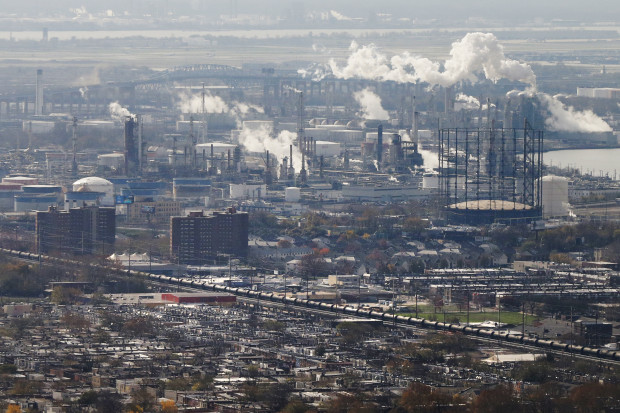DEP fines Delco refinery for air pollution violations
-
Susan Phillips

Matt Rourke / AP Photo
A refinery, homes and tank cars is seen Tuesday, Nov. 24, 2015, in Philadelphia. DEP fined Monroe Energy in Trainer Delaware County, $400,000 for air pollution violations.
Monroe Energy, an oil refiner in Delaware County, has agreed to pay $403,528 for releasing air pollutants that exceeded its permitted limits. Over the course of three years, between July 2013 and June 2016, Monroe’s violations included excessive releases of hydrogen sulfide, carbon monoxide, sulfur dioxide and nitrogen oxide. Pennsylvania’s Department of Environmental Protection reached an agreement with the company last week. The DEP says Monroe also “failed to satisfy the data availability requirements.”
Monroe Energy, a subsidiary of Delta Airlines, took over the shuttered Trainer refinery from ConocoPhillips in 2012 to produce jet fuel for the airline. The refinery is located along the Delaware River, in a densely populated area about 10 miles southwest of Philadelphia.
“This penalty reinforces how important it is for companies to accurately control, track and report their emissions,” said DEP Southeast Acting Regional Director Anderson Hartnell in a release. “We take air quality issues seriously, and it is our duty to protect the health and welfare of the citizens of the Commonwealth and the environment.”
The Clean Air Council’s executive director Joe Minott says given the number and amount of releases, DEP should have issued a higher fine. “If the plant was properly run they should have identified and corrected the problem much much sooner,” said Minott in an email. “Clearly DEP needs to be looking at this plant much more carefully. These are significant emissions over long periods of time.”
Monroe Energy spokesman Adam Gattuso said environmental excellence is one of the company’s “core values.” In an email, Gattuso said the refinery has the “smallest emissions rate per barrel of processed feed than any other refinery on the East Coast.”
Both the company and DEP say emissions have been reduced at the plant since a new flare gas recovery system was installed in late 2015. Refiners typically release toxic air pollutants when too much pressure builds up, creating a need to flare, or burn off, the oil. The new system is designed to recover that released gas rather than burn it.
















